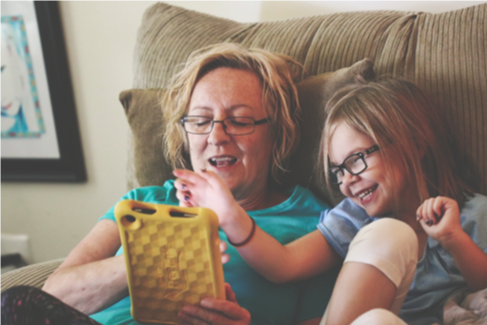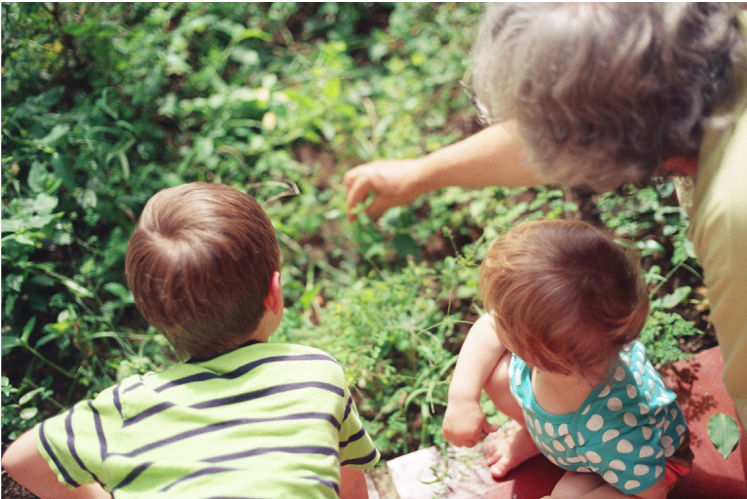A question families often ask us, is “Why does my autistic child become so upset whenever their Grandparents visit?”. The child may have a meltdown, cry when Grandma/Grandad arrives, refuse to let them in or try to push them back out the door! This can be stressful for everyone involved.
Why does this happen?
One reason why this may happen is that many parents rely on Grandparents to help out with childcare – this means that a visit from a Grandparent becomes associated with Mum/Dad leaving. This association with a parent leaving can be hard for the relationship between your child and their grandparents. For children with language delays, this may be the only way they know how to tell you that they don’t want Mum/Dad to leave. Other children may struggle with a lack of predictability in their day. To them, the grandparents visiting could mean that Mum/Dad might leave or might stay – this uncertainty can be stressful for some children.
What can you do?
There are a few practical strategies to reduce stress when Grandparents visit:
- Find the best way to communicate what is going to happen to your child
- Create structure and predictability if needed
- Pass on some rapport-building strategies to Grandma and Grandad to help create a new, positive association.
The best way to communicate whether you’re going out or staying when grandparents arrive will depend on your child’s level of understanding. This can be as simple as telling them directly, however, if your child has a limited understanding of words you might need to try a different strategy. For PECS users, showing them a picture might be best, whereas if your child uses signs or a speech device it may be more appropriate to do the same.
For children with limited language understanding, you can also use non-verbal cues to make things clearer.

Perhaps put your shoes and coat on as soon as the grandparents visit and leave as soon as possible. If you’re staying you can put some slippers on to make it extra clear you are not leaving. Whichever communication method you choose, make sure you’re consistent.
Structure and Predictability
Every child with autism is different and this point may not be relevant for all children. If your child struggles with small or large changes in routine or asks repetitive questions about future events, they may find a lack of structure and predictability difficult. There are many resources available online you can use to create a weekly visual schedule to help them understand what’s coming up in their week. You can use photos, symbols and writing to tailor this to your child’s unique level of understanding.
Relationship Building
To figure out if grandparents need support building their relationship with their grandchild, ask the following questions:
- Is my child excited to see their grandparent(s) when they arrive?
- Does my child approach their grandparent(s)
- Does my child initiate interactions with their grandparent(s)?
The strategies below all aim to help you create an association between Grandparents arriving and good things happening. Every child is different and it can take different amounts of time for these ideas to work. Be patient and consistent.
Toy Bags

You will recognise this as one of our teams’ favourite strategies for building relationships with children! We usually have a toy bag of special toys that the child only sees when we visit. This creates an association with our arrival with the arrival of lots of fun stuff! You can easily replicate this strategy with Grandparents.
Choose things the child enjoys the most so that they are extra special. Remind grandparents to join in when their grandchild plays with the toys!
Associating yourself with fun
Grandparents can start by giving their grandchild access to lots of fun items without requiring any response (you can just hand them to the child). They can comment on what they are doing to help associate their voice with fun but without requiring the child to respond. E.g., Say, “Here’s the blue train”

When interacting with your grandchild, look for ways to make play more fun because of your interaction. The goal of this is to show the child that playing is better with you than without you. For example, when playing with the trains model different things you could do – be creative! Find some other toys and have them run around the tracks, or fly a helicopter over the tracks and make sound effects. If you can find toys that your Grandchild can’t play with without your help, even better!
For more detailed tips for playing with children with autism, take a look at this blog post.
Please remember that there is no ‘one-size-fits-all’ approach to meltdowns or tantrums. There may be other factors causing a child to become unhappy when Grandparents visit (e.g. a sudden loss of attention while all the adults talk to each other). If you have concerns about any changes in your child’s behaviour recently, get in touch and find out if we can support you.



My 4 yr old grandson is autistic. I have been childcare provider since he was a baby and now hates it when he sees me. I know he relates me to mum leaving and I’ve tried very hard to make time together fun but he just doesn’t want to be with me. He just ‘accepts’ that I’m there till mum gets home. I don’t know how to relate to him. Can you advise please. I’m starting to dread seeing him..
I’m sorry, that must be really difficult. I’d suggest trying the strategies in this blog post. You might also find our blog “How to play with kids with autism” has some ideas to help you relate to him
thank you for the article
You’re welcome!
My granddaughter keeps saying I don’t like you nanny I only
Love my mommy it’s very hard I see her everyday take her to school sometimes with mommy sonetimes not
She says it mostly everyday and she’s not happy to see me
Help
That must be so difficult for you all. I hope these strategies were of some help to you